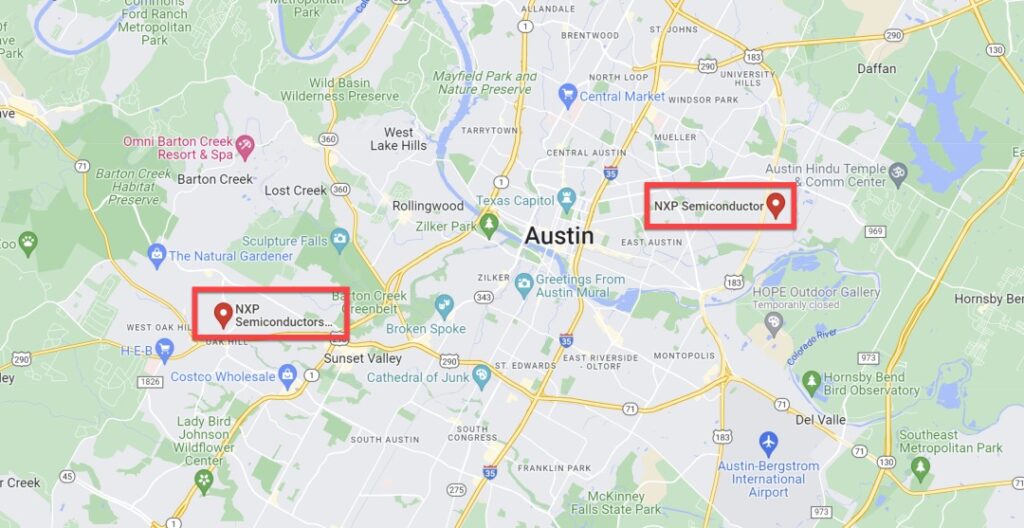NXP Semiconductors NV has taken a step forward with its plan to significantly expanding manufacturing in Austin with the help of tax breaks.
Austin Independent School District’s trustees voted May 19 to accept NXP’s application for Chapter 313 incentives, which could net the school district $80 million in funds over 10 years that are not eligible for recapture, or redistribution across the state.

The Netherlands-based company is considering investing up to $2.6 billion at either of its existing campuses in the Texas capital, creating 750 to 800 jobs with an average annual salary of more than $100,000.
The planned new development, named Project Gateway, consists of up to two separate sites and applications. NXP’s application includes two $125,000 fees paid to Austin ISD. Each application represents potential sites for expansion: on Ed Bluestein Boulevard in East Austin and in the Oak Hill neighborhood in South Austin.
The board of trustees emphasized that the application’s approval marks the start of negotiations and remains a long way from a final agreement.
“It is not binding,” said Yasmin Wagner, AISD trustee for District 7 and the board’s vice president. “What we are voting on tonight is the application.”
Chapter 313 of the Texas tax code allows school districts to cap the taxable value of a property for a portion of school taxes for up to 10 years, often saving companies tens of millions of dollars. Tesla’s new Austin gigafactory was awarded such tax breaks, for example.
The financial device was a topic of debate during the 2021 Texas Legislature, and the program was not renewed. It is not set to expire at the end of this year. The Texas comptroller has asked for applications to be submitted by June 1, upping the pressure on companies and school districts to hash out deals.
“What we are talking about here is getting in a queue and getting into negotiation,” said Kevin Foster, AISD trustee for District 3. “I am not thrilled with all aspects of it. I can’t turn away something that could turn into raises to teachers.”
A motion to accept the application, initiating negotiations between the school district and NXP, passed the board with approval from Foster, Wagner, President and District 6 Trustee Geronimo Rodriguez Jr., District 4 Trustee Kristin Ashy and District 5 Trustee Lynn Boswell.
It was opposed by At-Large Position 8 Trustee Noelita Lugo and District 2 Trustee Ofelia Zapata.
“I don’t like corporate welfare and Chapter 313 is the biggest corporate welfare program,” Zapata said. “I cannot support this kind of work.”
Secretary and At-Large Position 9 Trustee Arati Singh abstained from the vote and District 1 LaTisha Anderson was absent.
At the meeting, Ali Khataw, the chair-elect of the Greater Austin Chamber of Commerce and president and CEO of Encotech Engineering, shared support for the application. Meanwhile, more than 30 people expressed opposition, many of whom identified themselves as former educators or members of Austin Interfaith, a non-partisan, multi-ethnic organization that represents more than 40 congregations and has vocally opposed incentives recently.
Charlotte Garcia, who said she was a parent with students in the district, described the incentive as a failed corporate welfare program that has been ceased by bipartisan legislation.
“Our tax dollars need to go to schools, not for the bottom line of highly profitable organizations,” she said.
Those in opposition stated that NXP filed its application in a last-minute effort to take advantage of the outgoing benefit, sharing concern that the application only promised 25 new jobs., the minimum amount to participate in the program.
NXP’s representatives responded by sharing that the application will be revised to include 500 jobs.
“We want our tax money to go to public schools,” said Trenton Hendrickson, a member of the interfaith organization. “It is shameful to take the money from school children and fill the pocket of a multinational corporation.”
Néstor Ho, chief legal officer for Silicon Laboratories Inc., spoke in support of the application. He said the project would bring funds into the district to support its educators and staff while bolstering the state’s workforce.
“This project will provide $67 million in funding that would not be eligible for recapture and go toward our students and teachers,” Ho said.
NXP makes integrated circuits used in cars, mobile phones, communications infrastructure and other products. In addition to its Austin facilities, it operates semiconductor factories in Arizona, Singapore and the Netherlands. The company employs approximately 29,000 people in more than 30 countries and recorded 2021 revenue of more than $11 billion.
In Austin, NXP has about 1,300 employees, according to site selection consultants.
The company arrived in Austin in 2015 when it purchased Freescale Semiconductor, which had previously spun off from Motorola.

NXP is not alone in its effort to make use of the appraised value limitation set by Chapter 313 offering a 10-year limitation on the taxable property value for school district maintenance and operations taxes. Both Infineon Technologies AG and Applied Materials Inc. have applied for the incentives for new projects.
In 2021, Samsung Electronics Co. Ltd was approved for Chapter 313 incentives for its forthcoming Taylor semiconductor factory. And in 2020, Tesla Inc. was approved for the incentives for its electric vehicle plant that is now open in eastern Travis County.
Austin ISD approved a Chapter 313 for Hewlett-Packard Co. in 2006. And in 2005 and 2012, Samsung Austin Semiconductor LLC had Chapter 313 incentives deals approved by the Manor Independent School District.
The Article is from Austin Business Journal, copyright belongs to owner





